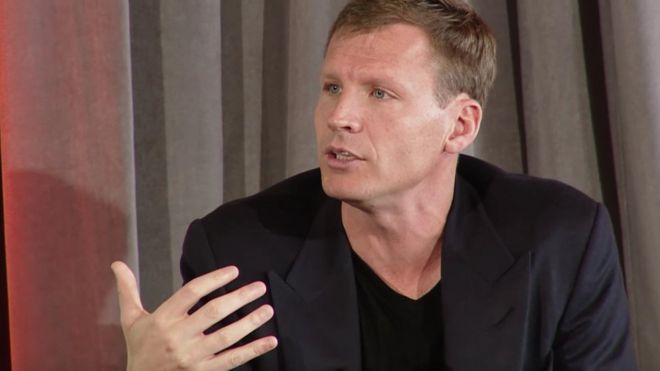
Justin Caldbeck said he was "so so sorry" over harassment claims
We may look back and see the events
of this week, where multiple scandals at Uber saw Travis Kalanick
removed as chief executive, as the beginning of a culture change across
Silicon Valley as a whole.
On Friday, we saw signs of what shape such a shift may take. In a post on the platform he runs, LinkedIn co-founder Reid Hoffman suggested the technology industry - and the complex spider's web of relationships within it - needs to agree on what he's called a Decency Pledge, a code of conduct most would consider to just be responsible, professional behavior, but in the technology business apparently needs to be hammered home.
Mr Hoffman's post - which I'll go into more detail about in a moment - followed a damning report published on Thursday by The Information - a subscription-only tech news service.
It shared details alleging several instances of sexual harassment by a prominent venture capitalist, Justin Caldbeck, who by Friday afternoon had taken a leave of absence from Binary Capital, where he is/was a managing partner.
The Information quoted several women, some of whom chose to make their identities public - a stance not often taken in this industry, but one buoyed by the efforts of Susan Fowler, the former Uber employee who blogged about her treatment at the firm, kicking off Uber's torrid phase.
From the report: "The women who made the allegations include Niniane Wang, who co-created Google Desktop and served as CTO of Minted, and Susan Ho and Leiti Hsu, co-founders of Journy, a travel planning and booking service.
"Ms Wang alleges Mr Caldbeck, while informally trying to recruit her for a tech company job, tried to sleep with her.
"Ms Ho said that Mr Caldbeck, while discussing investing in their start-up, sent her text messages in the middle of the night suggesting they meet up. Ms Hsu says that Mr Caldbeck groped her under a table at a Manhattan hotel bar."
'Many mistakes'
Mr Caldbeck responded to the allegations on Friday afternoon."The past 24 hours have been the darkest of my life," he said in a statement first reported by Axios.
"I have made many mistakes over the course of my career, some of which were brought to light this week. To say I'm sorry about my behavior is a categorical understatement. Still, I need to say it: I am so, so sorry."
He said he apologized for contributing to a "gender hostile" environment.
"The power dynamic that exists in venture capital is despicably unfair," he continued.
"The gap of influence between male venture capitalists and female entrepreneurs is frightening and I hate that my behavior played a role in perpetrating a gender-hostile environment. It is outrageous and unethical for any person to leverage a position of power in exchange for sexual gain, it is clear to me now that that is exactly what I've done."
Decency Pledge
Unlike Uber, a service used by millions around the world, the allegations against Mr Caldbeck will not generate many headlines. While well-known among the movers of Silicon Valley, like many big-time investors here, Mr Caldbeck operates in a world the majority of the public don't get to see.But the ramifications of this fall from grace, coming as it does so soon after the Uber scandal, point to a bigger picture in which those previously worried to speak out are deciding that it's a risk worth taking.
But LinkedIn's Mr Hoffman points out that preventing abuses of power between investors and those eager for their money - but not sexual advances - is difficult. Unlike a manager-employee relationship within a company, where good firms can use thorough HR measures to prevent abuse, these are interactions happening between people from separate firms, and one where the balance of power is tipped heavily in one direction.
In other words, there is no way to "refer up" a complaint - other than going to the press, a terrifying and potentially career-limiting approach.
"I think the industry should actively work on building a kind of industry-wide HR function," Mr Hoffman writes.
"So that venture capitalists who engage in such behavior face the same sort of consequences that they would if their overtures were directed at an employee."











0 comments:
Post a Comment